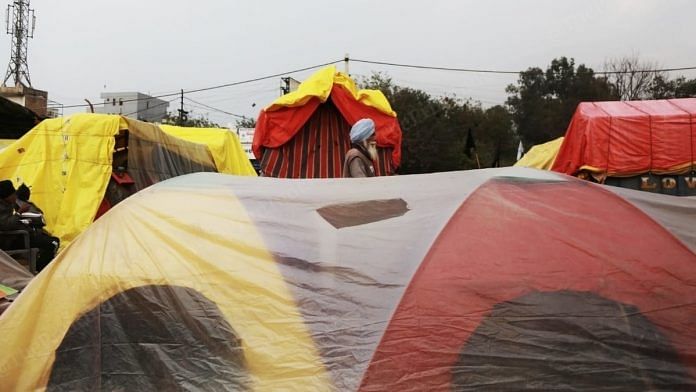Bengaluru: The ‘freezing’ temperature in the national capital has cut short the protest by Tamil Nadu farmers — yet again. The group, which joined the ongoing protests against the new farm laws at the Singhu border last month, returned in just two weeks as it could not cope with the cold weather.
Led by lawyer-farmer activist P. Ayakannu, a first delegation of the National South Indian Rivers Inter-Linking Farmers Association joined the protest on 7 December and returned on 9 December. A second delegation, without Ayakannu, joined on 18 December and went back on 30 December.
In 2017, too, cold weather had forced the Ayakannu-led group to withdraw its agitation. That year, though, it had protested for 141 days, in patches, at Jantar Mantar against the Centre’s alleged anti-farmer policies.
Ayakannu’s 2017 protests were best known for the bizarre methods employed, including wearing skulls and bones of the farmers who committed suicide, shaving off half their moustaches and beards, conducting mock funerals, staging mock suicides, rolling on the street, eating rats, drinking their own urine, consuming their own excreta, and stripping naked.
Also read: Farmers take out tractor march against farm laws at Delhi borders
Heart and soul with them
Speaking to ThePrint over phone about the second retreat, Ayakannu said, “They (delegation) had to come back as it was freezing there and we could not continue to stay with them. Our team returned on 30 December and since then we have been protesting in Trichy and other parts of Tamil Nadu.”
Ayakannu said he had 22 FIRs against him since the agitation began at the Singhu border. “Each day I protest, I have one new FIR listed against me,” he added.
“We are in complete solidarity with our farmer brothers in Singhu. We may not be there in flesh but our hearts and soul is with them,” he said.
His team had first planned to reach Delhi’s borders in November, when the agitation began there. However, Ayyakannu, along with three hundred others, was detained by the Tamil Nadu police after the protesters booked 450 tickets on a train to Delhi from Tiruchirappalli. The police said it would create a law and order issue and had orders to put them under house arrest.
“We raised slogans and launched ‘paper rockets’ with lists of our demands near the district collector’s office,” he said.
The TN farmers who participated in the protests at Singhu also said they owe gratitude to gurdwaras for feeding them when they sat in protest at Jantar Mantar in 2017 and 2018.
“When thousands of farmers from Tamil Nadu had protested at Jantar Mantar, only gurdwaras provided us with food, shelter, medical help and everything. That is the reason, the Punjab farmers are our brothers and sisters. Not only that, if there is no Punjab, there is no India,” said R. Sellaperumal, state propaganda secretary, National South Indian River Inter-Linking Farmers’ Association.
Support from the south was also seen at the protests when Punjabi and Tamil versions of Iqbal Bano’s rendition of Faiz Ahmad Faiz’s ghazal ‘Hum Dekhenge’ appeared.
Farmers from Tamil Nadu also expressed online solidarity with their fellows from Punjab and Haryana, with the hashtag #Madrasis4Punjabis.
The 2017 ‘over the top’ protests
Ayakannu and his farmer supporters first hit the headlines when they travelled from Tiruchirappalli to Delhi in 2017 to protest. It was notable due to the methods of protest adopted. The leader maintained these methods were used so that the protest was effective.
For 141 days, the group agitated against the Modi government’s decisions such as formation of a Cauvery Management Committee, linking of river water from Ganga and Cauvery, loan waivers, pension for farmers above the age of 60 years, among other policies.
Ayakannu said his group started the protests in March 2017 but withdrew soon after due to an assurance from Tamil Nadu Chief Minister E. Palaniswami to help meet their demands and appeal to the Centre.
“That never happened. In this country, farmers are the backbone of India only during elections, otherwise after the elections, we become slaves of India,” he added.
The group resumed its protest in July 2017 but had to end it by October as the rainy season and onset of winter left most of its members sick.
With inputs from Revathi Krishnan.
Also read: Rahul backs farm protests but Amarinder ‘keen’ they end, deploys officials to broker truce




Just like flies are attracted to the flames – these professional protestors are attracted to protesting on the roads for anything and everything.
Shows how right it was rhat they were ignored earlier…
Ultra left wing radicals supported by journalists are infiltrating the farmers movement.
This group though small in number is known to support RIOTERS.
And both government and farmers must not let these group of ultra left wing radicals supported by journalists create law and order issues.